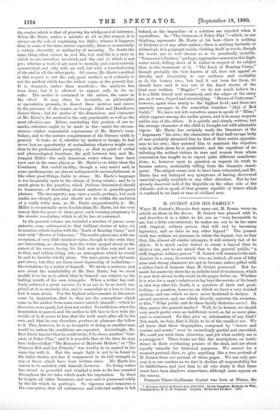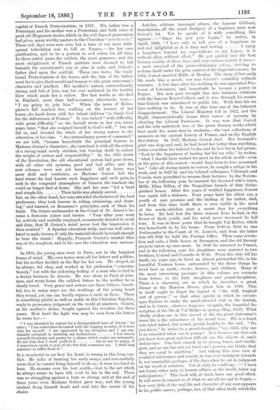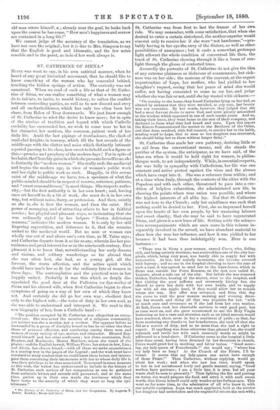M. GUIZOT AND HIS FAMILY *
WHEN M. Guizot's Memoirs first came out, M. Renan wrote an article on them in the _Revue. M. Guizot was pleased with it, and describes it in a letter to his son as "very favourable to me, but a little conventional; he makes me out to be the same stiff, tragical, solitary person that will end by becoming legendary, and as false as any other legend." The present work was written, we presume, to refute the legend; but we fear that, like almost all similar attempts, it will entirely fail of its object. It is much easier indeed to create a legend than to destroy one, and we are afraid that to the general public, "a stiff, tragical, solitary person" M. Guizot will remain to the end. Austere in a sense, he certainly was, as, indeed, all men of lofty aims and strong character are apt to become, unless gifted with a richer fund of humour than M. Guizot possessed. But be- neath his austerity there lay an infinite fund of tenderness, which is now first shown to the world in the pages before us. Whether it is wise for a man's relatives to lay bare the secrets of his heart in this way after his death, is a question of taste and good- feeling,—a question, however, on which we have a very decided opinion, and one which we have never hesitated to declare. A second question, and one which directly concerns the reviewer, is this," What public end do these family histories serve Do they amuse the general reader ? Well, to be honest, we should very much prefer even an indifferent novel, so far as mere plea- sure is concerned. Do they give us information of any kind ? Not much, we fear, that is likely to be of the smallest use. We all know that these biographies, composed by "sisters and cousins and aunts," must be exceedingly partial and one-sided. We could not wish them otherwise, and yet what earthly use is a panegyric ? These books are like the inscriptions on tomb- stones in their everlasting praises of the dead, and are about equally valuable for historical purposes. We cannot for a moment pretend, then, to give anything like a true portrait of M. Guizot from our perusal of these pages. We can only pre- sent it to our readers as we find it, decline all responsibility for its faithfulness, and just hint to all who study it that there must have been shadows somewhere, although none appear on the canvas.
Francois Pierre Guillaume Guizot was born at Nimes, the
• itelsieur Outset La Private Life, 1787.1874. By his Daughter. Madame de Witt. Translated by M. C. M. Simpson. London ; Hurst and Blackett. 1830.
capital of French Protestantism, in 1787. His father was a Protestant and his mother was a Protestant, and both came of
good old Huguenot stocks, which in the evil days of persecution had given many worthy pastors to the Churches" setts in (Tax."
These evil days were now over, but a time of yet more wide- spread tribulation was to fall on France, — for her own purification, and to be a portent to evil rulers for all time. In those awful years the noblest, the most generous, and the most enlightened of French patriots were doomed to fall beneath the executioner's are or pine in exile, and Guizot's father died upon the scaffold. These two facts; the tradi- tional Protestantism of his house, and the fate of his father, went far to give their mould and temper to the great statesman's character and intellect. His mother's nature, extraordinarily strong, and full of love, was for ever saddened by the terrible blow which made her a widow. Her last words, as she died in England, more than half-a-century afterwards, were,— " I am going to join him." When the news of Robes- pierre's fall reached her, walking on the terrace of her house, she knelt down with her infant children "to thank God for the deliverance of France." It was indeed " with difficulty, with great difficulty," as she herself wrote to her son, many
years later, "that she resigned herself to God's will ; g' but she
did so, and devoted the whole of her strong nature to the education of her sons. "An extraordinary power of command," we are told, "became henceforth the principal feature in Madame Guizot's character ; she exercised it with all the ardour of a strong mind sorely stricken, but bracing itself to endure the weight of sorrow and responsibility." In the wild storm of the Revolution, the old educational system had gone down, with all other old systems, good and bad alike, and the new schemes were not yet launched. All at home was mere drift and confusion, so Madame Guizot left the land. where she had known such happiness and such pain, to seek in the congenial atmosphere of Geneva the teachers she could no longer find at home. She and her sons "led a hard and simple life Their table was plainly served but, on the other hand, her sons attended the lectures of the best professors ; they took lessons in riding, swimming, and draw- ing," and learned, on Rousseau's principles, each of them his trade. The future ambassador at the Court of St. James's be- came a first-rate joiner and turner. "Year after year went by, actively and usefully employed, so austerely devoted to work and duty, that M. Guizot's mind never lost the impression it then received." A Spartan education truly, and one well calcu- lated to make heroes, if only the material should be tough enough to bear the strain ! Happily, Francois Guizot's mental fibre was of the toughest, and in his case the education was success- ful.
In 1805, the young man went to Paris, not in the happiest frame of mind. His own tastes were all for letters and politics, but his mother decided on the Bar for her son. He obeyed, as he always did obey, and worked at his profession "conscien- tiously," but with the sickening feeling of a man who is tied to a dreary business he detests. He was alone in Paris at nine- teen, and wrote home the saddest letters to the mother he so dearly loved. Very grave and serious are these letters; beauti- ful, too, in many ways are the workings of the young heart
they reveal, yet one can hardly repress a smile at them. There is something pitiful as well as noble in this Christian Eujolras, ready to pronounce judgment on the world at nineteen. Guizot, at his mother's desire, fought against his vocation for three
years. How hard the fight was may be seen from the letters he wrote her :—
" I was intended by nature for a distinguished man of letters," he cries ; "I am sometimes devoured with the longing to write, if it were only for myself : I am oppressed by my thoughts, and I am con-
tinually occupied in resisting my inclinations I feel drawn towards literature and poetry by a charm which makes me miserable.
Do not fear that I shall yield to it but do not be angry, if I sometimes speak to you of the fire that consumes me. I shall long continue to suffer from it."
It is wonderful to see how his heart is wrung in this long con- flict. He talks of burning his early essays, and remorsefully owns that he cannot bring himself to do so ; it were too hard to bear. He mourns over his lost youth,—lost to the art which he always seems to have felt must be his in the end. There was no struggling against a bent so strong, and at the end of three years even Madame Guizot gave way, and the young student flung himself heart and soul into the career of his choice. Articles, editions (amongst others, the famous Gibbon), translations, all the usual drudgery of a beginner, were now Guizot's lot. Yet he speaks of it with something like rapture : —" Since the new year began," he writes, in April, 1808, "I have only to tell you of a happiness as
real and delightful as it is deep and lasting I enjoy a happiness beyond my expectations or my hopes ; it is without alloy, without effort." He got quickly into the best literary society of those days, and very curious society it was,— a mere survival of the prerevolutionary salons, striving to re-form itself under the grim control of the Imperial censors. In 1812, Guizot married Mdlle. de Meulan. The story of her early life reads like a novel; nor was C uizot's courtship without romance. A few days after his wedding he was appointed Pro- fessor of Literature, and henceforth he became a power in France. His new post brought him into intimate relations with the famous Royer-Collard, and it was through his means that Guizot was introduced to public life. With that life we have nothing to do. It was at this time one of the bitterest disappointment. The Liberal Ministry fell in 1822, and the Right characteristically began their career of tyranny by silencing the Liberal Professors. It was now that Guizot and his wife undertook two of the great literary works which have made his name dear to students,—the vast collections of memoirs on the ancient history of France, and on the English Revolution. In 1827, Madame 0 uizot died. Her husband's grief was deep and real; he had loved her better than anything, better even than his beloved books, and he lost her in her prime. "Next to the happiness of having her for my wife," he writes, "what I should have wished for most in the whole world—even at the price of this sorrow—would have been to have possessed her." Like all strong minds in sorrow, he sought a refuge in his work, and in 1827 he and his Liberal colleagues, Villemain and Cousin, were permitted to resume their lectures. In the Novem- ber of the following year he married his deceased wife's niece, Mdlle. Eliza Dillon, of the Neapolitan branch of that distin- guished house. After five years of wedded happiness, Guizot was again left a widower. Four years later his eldest son, a youth of rare promise and the darling of his father, died, and from this time forth there is ever visible in the mind of the sorely-stricken man a secret fear for everything he loves. He had lost the three dearest lives he had, in the flower of their youth, and his mind never recovered its full tone. It was in these years that he bought Val Richer, which was henceforth to be his home. From 1840 to 1846 he was Ambassador to the Court of St. James's, and from the latter date till 1848 he held the Foreign Office. Then came revolu- tion and exile, a little house at Brompton, and the old literary projects taken up once more. In 1849 he returned to France, and in the following year his daughters were married to two brothers, Conrad and Cornelis de Witt. From this date till his death, six years ago, he lived an almost patriarchal life, in his beautiful Norman home, surrounded by the three things he loved best on earth,—books, flowers, and children. Many of the most interesting passages in this volume are extracts from letters to his little daughters and grand-daughters. There is a charming one in which lie describes a great dinner at the Mansion House, given him in 1840. This in itself ought to dispel the legend of "the stiff, tragical sort of person ;" or that other epistle in which he encour- ages Pauline to make the much-dreaded visit to the dentist, and to be brave, whatever happens ; or again, the beautiful de- scription of the life at Val Richer in spring (May, 1857). What chiefly strikes one in this record of the the great statesman's inner life is the robustness of his moral tone. His is a heart sore tried indeed, but sound, genial, healthy to the end. "Do you know," he writes to a grand-daughter, "my child, why one is so conceited when one is young ? It is because one does not yet know how great and how difficult are the objects of one's endeavours. One feels oneself to be strong, brave, and intelli- gent, and as one has not yet tried one's powers, one thinks that they are equal to anything." And taking thits wise view of youthful intolerance and conceit, he was ever indulgent towards it, not unmindful, perhaps, of the days when he sat in judgment on the world at nineteen. Yet at sixty he could say :—" I have not found either men, or human affairs, or the world, below my anticipations." This book will, at least, have one good' effect. It will serve to remind us of what we are all to apt to forget,— how very little of the real life and character of any man appears in his public career; perhaps, too, of that other truth which the
old man utters himself, a-, already near the goal, he looks back upon the course he has come, "How muel happiness and sorrow are contained in a long life !"
We cannot judge of the accuracy of the translation, as we have not seen the original ; but it is due to Mrs. Simpson to say that the English is good and idiomatic, and the few notes sensible and to the point, as indeed her work always is.




































 Previous page
Previous page